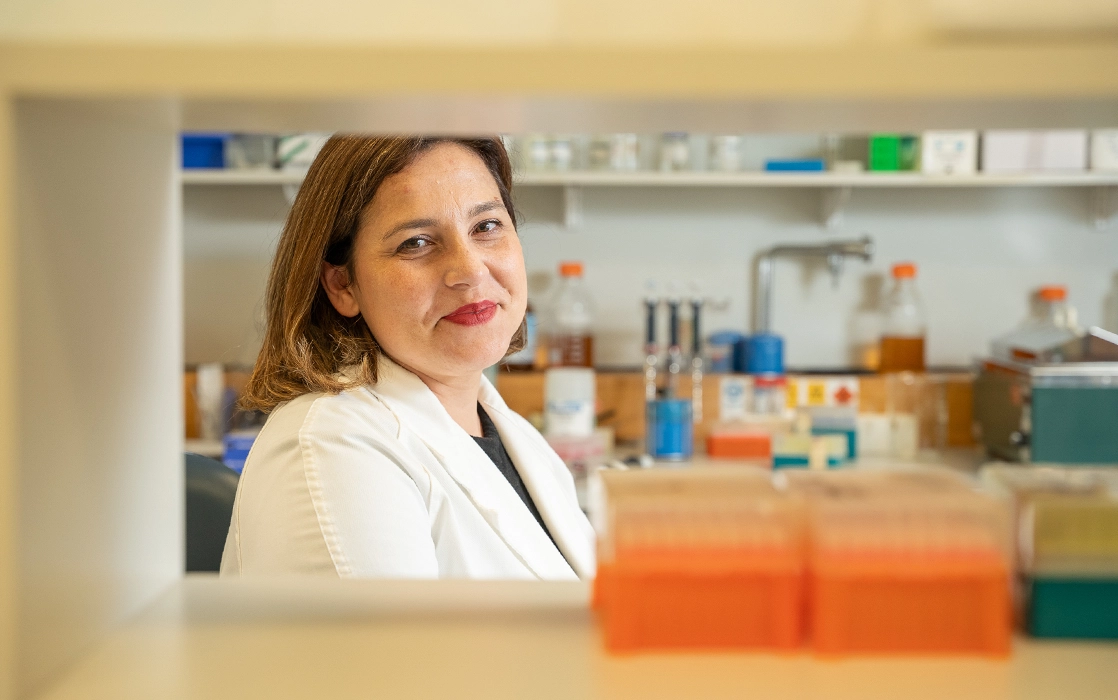Unlocking treatment pathways for aggressive breast cancers

A protein called DDAH2 could hold the key to new and innovative treatments for triple-negative breast cancer, an aggressive form where treatments are invasive and often ineffective.
Until recently, scientists thought that DDAH2 behaved like its “sister protein”, DDAH1. But new research has shown that’s not the case. Dr Tommasi has been uncovering what this protein really does.
“This protein is known to be important in the formation of blood vessels that bring oxygen and nutrients to the cancer cells”, said Dr Tommasi.
“These blood vessels allow the cells to survive and spread.”
Normally, blood vessels form through a standard process – one that existing drugs are designed to block. But cancer cells can adapt and use a backup pathway that’s much harder to target with today’s treatments.
This back-up pathway is called a resistant mechanism, and it makes current drugs less effective.
“What’s interesting about this protein is that it is found to be important in this resistant mechanism.
For the first time, we’ve identified that this protein doesn’t just block the normal blood vessel formation, but also the resistant mechanism.”
When they removed the protein, Dr Tommasi observed some important changes in the way the cancer behaves.
“When we remove this protein, the cancer cells change significantly. We can see a very big change in the behaviour of these cells and their capacity to divide and spread.”
Dr Tommasi hopes that, if we can fully understand the role of DDAH2 and find specific interactions, we can design a way to block this protein and develop a completely new class of drugs that improve the prognosis for these patients.

Seed funding makes a new chapter of breast cancer research possible
This preliminary data and validation were made possible through a Flinders Foundation Health Seed Grant.
Thanks to our generous supporters, researchers like Dr Tommasi are able to uncover important findings such as the role DDAH2 protein plays in triple-negative breast cancer, leading to potential life-changing treatments.
“People can’t even imagine how impactful their donation can be”, said Dr Tommasi.
“Sometimes it seems like a small thing, or a small donation, but together a small thing becomes a big thing. And a big thing for the person who’s fighting hard every day to make their work possible and for the person who, one day along the line, is going to receive that help.
Thank you for giving us this opportunity to give back something significant.”
Community is crucial to funding research
“It’s not always easy, it’s difficult, but they make it worth it. The donors and the people that keep funding research are what keeps us going”, Dr Tommasi said.
“Feeling that other people see the work you’re doing and can see the importance of what you’re doing keeps that spark and gives you more motivation to keep doing more, knowing that what you’re doing is worth it, not just for yourself, but for everyone.”
Learn more about Flinders Foundation Health Seed Grant Round
Flinders Foundation, in partnership with Flinders University, proudly offers seed grant funding each year through the Flinders Foundation Health Seed Grant Round.
More stories about
Keep up to date
Subscribe to our newsletter to receive information on our latest news and events

















